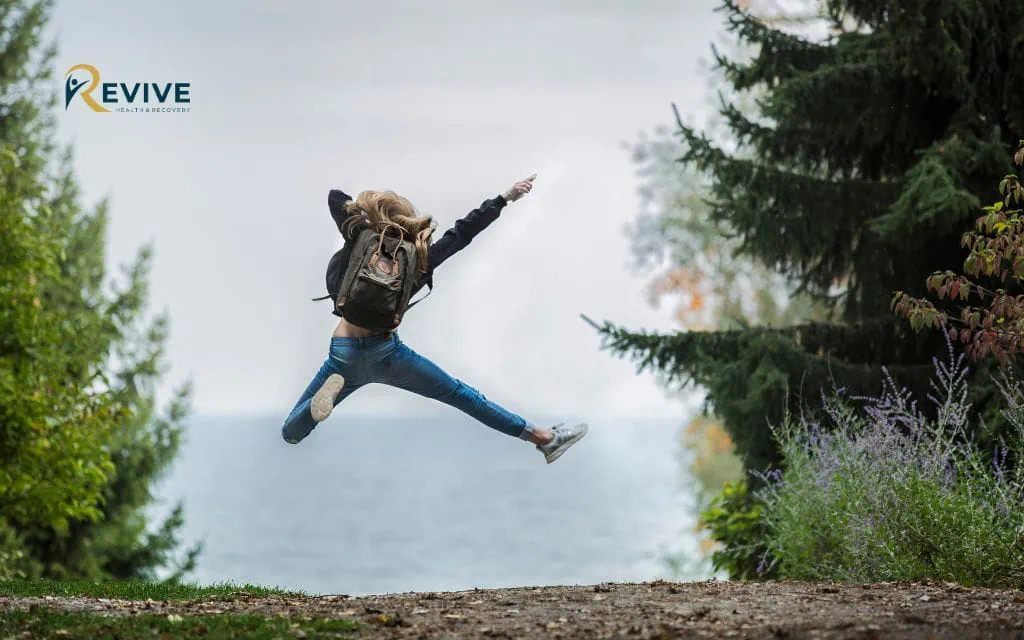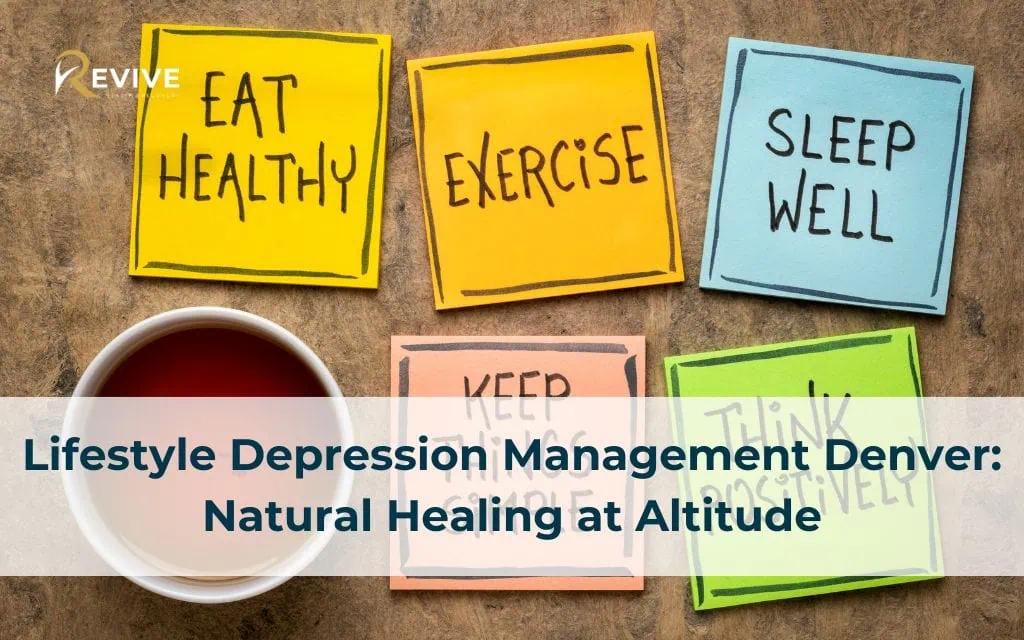Depression affects approximately one in eight Denver residents which is about 76,100 people with most not receiving adequate treatment. Denver’s unique environment, particularly its mile-high altitude, creates distinctive challenges and opportunities for managing depression through lifestyle approaches. Research shows that high altitude can affect brain chemistry, potentially impacting mood and requiring specialized management strategies.
However, Denver also offers exceptional resources for lifestyle-based depression treatment, from abundant outdoor spaces to a wellness-oriented culture. This article explores evidence-based lifestyle approaches tailored specifically to Denver’s environment, providing actionable strategies for managing depression symptoms through nature connection, sleep optimization, social engagement, and stress reduction techniques.
Whether you’re seeking alternatives to traditional treatment, complementary approaches to enhance existing care, or preventive strategies, these Lifestyle depression management Denver interventions can help improve your mental wellness while addressing the unique challenges of life at elevation.
Outdoor Therapy and Nature Connection
- Mountain-Specific Therapeutic Benefits
Denver’s elevation creates a unique opportunity for outdoor depression therapy. The reduced oxygen levels at altitude trigger increased red blood cell production, which can enhance oxygen delivery to the brain and potentially improve mood regulation. Research shows that altitude-specific physical activity impacts brain chemistry differently than sea-level exercise.
Local practitioners have developed specialized programs that leverage this environment. Rocky Mountain outdoor healing sessions combine traditional therapy with controlled exposure to Denver’s mountain environment, helping participants understand how their bodies respond to altitude while building resilience.
- Practical Nature Integration
Start with Denver’s extensive park system. Washington Park offers gentle walking paths perfect for beginners, while Cheesman Park provides elevated views that can shift perspective during difficult days. For those ready for more challenge, nearby foothills like Mount Falcon offer moderate hikes with substantial mood benefits.
The key lies in consistency rather than intensity. Daily 20-minute walks in Denver’s parks can provide measurable improvement in depression symptoms within two weeks. The combination of natural light, fresh air, and gentle movement creates a powerful therapeutic trifecta.
- Community Nature Programs
Denver community mental health resources include organized outdoor therapy groups that meet in places like Cherry Creek State Park and Red Rocks. These programs address both the isolation often accompanying depression and the need for guided exposure to Denver’s healing environment.

Ready to explore outdoor therapy options for Lifestyle depression management Denver? Contact Revive Health Recovery at (303) 268-4655 to learn about our Denver-specific outdoor wellness programs.
Sleep and Circadian Rhythm Management at Altitude
Altitude’s Impact on Sleep and Depression
Denver’s elevation significantly affects sleep patterns, which directly influences Lifestyle depression management Denver severity. Local sleep studies have documented correlations between altitude-related sleep disruption and increased depression symptoms. The reduced air pressure can fragment sleep, while the intense mountain sunlight affects melatonin production differently than at sea level.
Specialized Light Therapy Protocols
Denver practitioners have developed light therapy protocols adjusted specifically for mountain sunlight patterns. Unlike standard light therapy, Denver’s approach accounts for the increased UV intensity at altitude and the longer seasonal daylight variations.
Morning light exposure between 7-9 AM proves most effective in Denver’s climate. Position yourself near east-facing windows or spend 15 minutes outdoors during this window to reset your circadian rhythm. The mountain light’s intensity means shorter exposure times can achieve the same benefits as longer sessions at sea level.
Sleep Optimization Strategies
Create a sleep environment that works with Denver’s unique conditions. Blackout curtains become essential due to the intense morning light, while humidifiers counter the dry air that can disrupt sleep quality. Keep bedroom temperatures slightly cooler than you might elsewhere, as the body works harder to oxygenate at altitude.
Establish consistent sleep schedules that account for altitude adjustment. Even longtime Denver residents benefit from structured sleep routines that support the body’s ongoing adaptation to elevation.
Social Connection and Community Activities
Addressing Altitude-Related Isolation
Many newcomers to Denver experience unexpected mood changes related to altitude adjustment, often leading to social withdrawal. The city’s mental health community recognizes this pattern and has developed specific programs to counter isolation effects associated with high-elevation living.
Denver-Specific Connection Opportunities
The city offers numerous depression-focused social connection programs. Denver meetup groups specifically for altitude adjustment provide peer support from others navigating similar challenges. Volunteering opportunities with organizations like the Colorado Trail Foundation combine social interaction with outdoor exposure.
Community gardens throughout Denver create opportunities for both social connection and therapeutic activity. Programs at places like GrowHaus combine urban agriculture with peer support, addressing multiple aspects of lifestyle depression management Denver simultaneously.

Building Support Networks
Focus on activities that acknowledge your adjustment process. Denver support groups for depression often include education about altitude effects, helping participants understand that their experiences are normal and manageable.
Join activities that celebrate Denver’s unique culture while building connections. From First Friday Art Walks to community hiking groups, these gatherings provide natural opportunities for meaningful social interaction without the pressure of traditional support group formats.
Stress Reduction and Resilience-Building Techniques
Denver-Specific Mindfulness Practices
Local practitioners have developed mindfulness techniques that incorporate Denver’s mountain environment and address altitude’s physiological effects. These practices focus on breathing techniques adapted for reduced oxygen levels and visualization exercises that use familiar Denver landscapes.
Mountain-based meditation practices help participants connect with their environment while building stress resilience. Programs often begin in places like the Denver Botanic Gardens, providing controlled natural settings for skill development.
Stress Management Programs
Denver stress reduction workshops address the unique stressors of high-altitude living, including the physical stress of altitude adjustment and the social challenges of relocating to Colorado. These programs teach practical techniques for managing both acute stress and chronic depression symptoms.
Resilience-building techniques focus on working with rather than against Denver’s environment. Participants learn to recognize early signs of altitude-related mood changes and implement appropriate lifestyle adjustments.
Practical Implementation
Start with short, daily practices that account for Denver’s environment. Five-minute breathing exercises using techniques adapted for altitude can provide immediate stress relief. Gradually build to longer practices as your body adjusts.
Combine stress reduction with Denver’s natural advantages. Practices like walking meditation in City Park or mindful observation at the Denver Art Museum create multi-sensory experiences that enhance traditional stress management techniques.

Need personalized stress management strategies? Revive Health Recovery’s team understands Denver’s unique challenges. Call (303) 268-4655 to discuss your specific situation.
Integrating Lifestyle Approaches into Treatment
Comprehensive Care Approach
Effective lifestyle depression management in Denver requires understanding how various approaches work together. Sleep optimization supports outdoor therapy effectiveness, while social connection enhances stress reduction benefits. This interconnected approach addresses depression’s multiple facets while leveraging Denver’s unique advantages.
Professional Guidance Benefits
While lifestyle approaches offer significant benefits, professional support ensures safe, effective implementation. Revive Health Recovery specializes in integrating lifestyle approaches with evidence-based treatment, creating personalized plans that account for Denver’s specific environmental factors.
Creating Your Action Plan
Begin with one area that feels most manageable. If sleep disruption is your primary concern, start with circadian rhythm adjustment before adding outdoor activities. If isolation feels overwhelming, prioritize social connection while gradually incorporating other elements.
Track your responses to different approaches. Denver’s environment affects people differently, and what works best for you may differ from standard recommendations. Professional guidance helps identify your optimal combination of lifestyle interventions.
Long-term Success Strategies
Sustainable lifestyle depression management Denver requires gradual implementation and ongoing adjustment. As your body adapts to altitude and lifestyle changes take effect, your needs will evolve. Regular check-ins with mental health professionals ensure your approach remains effective.
Build flexibility into your plan. Denver’s weather and seasonal changes require adaptable strategies that maintain effectiveness year-round. Having multiple options ensures consistency even when conditions change.
FAQs About Lifestyle Depression Management Denver
How long does it take to see results from lifestyle depression management in Denver?
Most people notice initial improvements within 2-3 weeks of consistent implementation. However, full adaptation to Denver’s altitude can take 3-6 months. Revive Health Recovery provides ongoing support throughout this adjustment period.
Can lifestyle approaches replace medication for depression in Denver?
Lifestyle approaches can be highly effective, but treatment decisions should always involve mental health professionals. Revive Health Recovery’s team can help determine the best combination of approaches for your specific situation.
What if I’m new to Denver and struggling with altitude-related mood changes?
Altitude adjustment commonly affects mood, and you’re not alone. Revive Health Recovery specializes in helping newcomers navigate Denver’s unique challenges while building effective coping strategies.
How does Denver’s altitude specifically affect depression treatment?
Altitude affects sleep, appetite, and energy levels, which can intensify depression symptoms. However, it also provides unique therapeutic opportunities. Professional guidance helps maximize benefits while minimizing challenges.
Are there costs associated with lifestyle depression management programs?
Program costs vary depending on specific services and insurance coverage. Contact Revive Health Recovery at (303) 268-4655 to discuss options that fit your situation and learn about insurance acceptance.
Take Your Next Step
Living with depression in Denver doesn’t mean accepting limitations. The city’s unique environment, when properly understood and utilized, offers exceptional opportunities for healing and growth. Lifestyle approaches provide powerful tools for managing depression while building long-term resilience.
You don’t have to navigate this journey alone. Revive Health Recovery combines professional expertise with deep understanding of Denver’s specific challenges and opportunities. Our team helps you develop personalized strategies that work with your life and Denver’s unique environment.
Ready to explore lifestyle depression management Denver approaches that fit your needs? Contact Revive Health Recovery today at (303) 268-4655 or email contact@revivehealthrecovery.com. Take the first step toward feeling like yourself again in the Mile High City.



